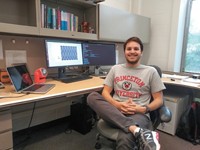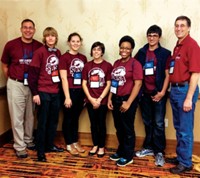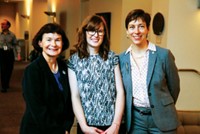Advertisement
Grab your lab coat. Let's get started
Welcome!
Welcome!
Create an account below to get 6 C&EN articles per month, receive newsletters and more - all free.
It seems this is your first time logging in online. Please enter the following information to continue.
As an ACS member you automatically get access to this site. All we need is few more details to create your reading experience.
Not you? Sign in with a different account.
Not you? Sign in with a different account.
ERROR 1
ERROR 1
ERROR 2
ERROR 2
ERROR 2
ERROR 2
ERROR 2
Password and Confirm password must match.
If you have an ACS member number, please enter it here so we can link this account to your membership. (optional)
ERROR 2
ACS values your privacy. By submitting your information, you are gaining access to C&EN and subscribing to our weekly newsletter. We use the information you provide to make your reading experience better, and we will never sell your data to third party members.
Awards
7 graduate students receive first-ever ACS Pride Merck Graduate Research Awards
by Sara Cottle
June 21, 2024
| A version of this story appeared in
Volume 102, Issue 19

This year, seven graduate students were awarded an ACS Pride Merck Graduate Research Award for the first time. Each awardee receives a $1,500 stipend to cover expenses to attend the American Chemical Society spring national meeting, where they present their research at an ACS Pride Merck Graduate Research Award half-day symposium and accept their award. The first symposium took place in April this year at ACS Spring 2024 in New Orleans.
This award also pairs awardees with an industry employee as part of a 1-year mentorship program. Kerrie Simone, who is one of the award mentors working at Merck, described the process as a little different from other mentoring programs she’s done. She and her mentee met three times before the ACS spring meeting, taking the time to get to know each other. She pinpointed what her mentee truly wanted out of his career on the first meeting, allowing for subsequent meetings to be more about science and to build more comfortably on showing her mentee what it was like to work in industry.
“I think it’s nice for people in academics to see in industry that people are out. . . . The students that got the awards are in school, and so they’re in this insular environment. And I think you can’t always tell,” says Simone. “I’m heavily involved in [diversity, equity, and inclusion] events at both the Boston and Cambridge sites that I’ve worked at for Merck. And I think we’ve moved from just having diversity that you can see to really understanding that inclusion comes from having a truly diverse group of people.”
Simone is a big fan of the award, noting that particularly in an award type of forum it’s still rare to see a focus on the LGBTQ+ community. “Feeling included in belonging is what’s really critical to help you want to stay at your job. We’re doing great science. Lots of places are doing great science. Everyone has opportunities to leave. But what really helps us stay is feeling included at work, really bringing your whole self to work,” says Simone.
The inaugural awardees were asked two questions by email on how they felt about receiving the award and how it’s helped their research. The following is a list of awardees with their responses, which have been edited for length in this article.
Corey Davis of the University of North Carolina at Chapel Hill on how they felt about receiving the award: “Ultimately, receiving the ACS Pride Merck Graduate Research Award is a profound and multifaceted honor. It fills me with joy, humility, and a renewed sense of purpose. It validates the importance of diversity and inclusion efforts and inspires me to continue working toward a more equitable future in the chemical sciences. This award is a celebration of community, collaboration, and the collective pursuit of excellence and inclusivity.”
Joe Forzano of the University of Illinois Urbana-Champaign on how they felt about receiving the award: “While being given this award in itself is amazing, it is an even greater honor to be a part of the ongoing movement to increase representation for queer scientists at all levels in chemistry and in the ACS organization. I feel very lucky to have gotten the chance to attend the ACS national meeting to present my work, to meet the incredible Merck mentors and scientists associated with this program, and to make a group of friends and future colleagues within our cohort.”
Eric Geunes of Princeton University on how they felt about receiving the award: “This award has allowed me to continue building strong scientific and queer communities in my life, and I am excited to be a part of this initiative to celebrate queer identities in chemistry. It has also prompted me to reflect on my experience thus far in the field; I am so thankful for the mentors and peers who have challenged and supported me while encouraging me to embrace my identity as an LGBTQIA+ chemist. This experience has strengthened my desire to advocate for underrepresented groups and to contribute to making chemistry a more inclusive and equitable space for all.”
Gabriel Halford of the University of Virginia on how this award has helped with their research: “The one-on-one mentorship aspect of this award has been really helpful for refining my professional goals and learning more about the different possible professional paths within research. My mentor has been a wonderful resource for refining my research communication and professional skills, as well as a great new friend.”
José Hernández-Meléndez of the University of Michigan on how they felt about receiving the award: “My hope is that this is just the beginning of a snowball effect within our scientific community to recognize the amazing science queer graduate students are doing whilst pinpointing the importance of highlighting LGBTQ+ voices in chemistry.”
Sydney Schoellhorn of the University of North Texas on how this award has helped their research: “At the ACS meeting, I was able to spend more time with industry chemists than ever before. It has been my experience that, in academia, it can be difficult to see a path into a career in industry. As people teach what they know, much of what we learn about getting jobs in my program is limited to postdoctoral or tenure-track positions. However, this award has completely changed the game for me. I was able to spend the week networking with queer industry scientists with valuable insights into how to get a job in industry, what to do to prepare, when to start applying, and infinitely more helpful pointers.”
Jordan Thompson of the California Institute of Technology on how they felt about receiving the award: “It has been really validating to see the buy-in from ACS, Merck, and my peers in support of LGBTQIA+ students in [science, technology, engineering, and math (STEM)]. While there is a lot of work to be done, programs like these serve as significant opportunities for historically underrepresented groups in STEM. I will continue to serve as an advocate in this area!”
This award will be given annually to seven graduate-program students. To be eligible to apply, an applicant must be a US citizen studying anywhere, or a non-US citizen attending a graduate program in the US or Canada; be a member of ACS, the Division of Professional Relations, and the subdivision ACS Pride; and be available to present their research at the ACS spring national meeting. For more information on the application process and to apply, visit cenm.ag/acs-pride-merck-award.
CORRECTION:
This article was updated on June 26, 2024, to correct the spelling of a mentor's first name. It is Kerrie, not Kerri.





Join the conversation
Contact the reporter
Submit a Letter to the Editor for publication
Engage with us on Twitter